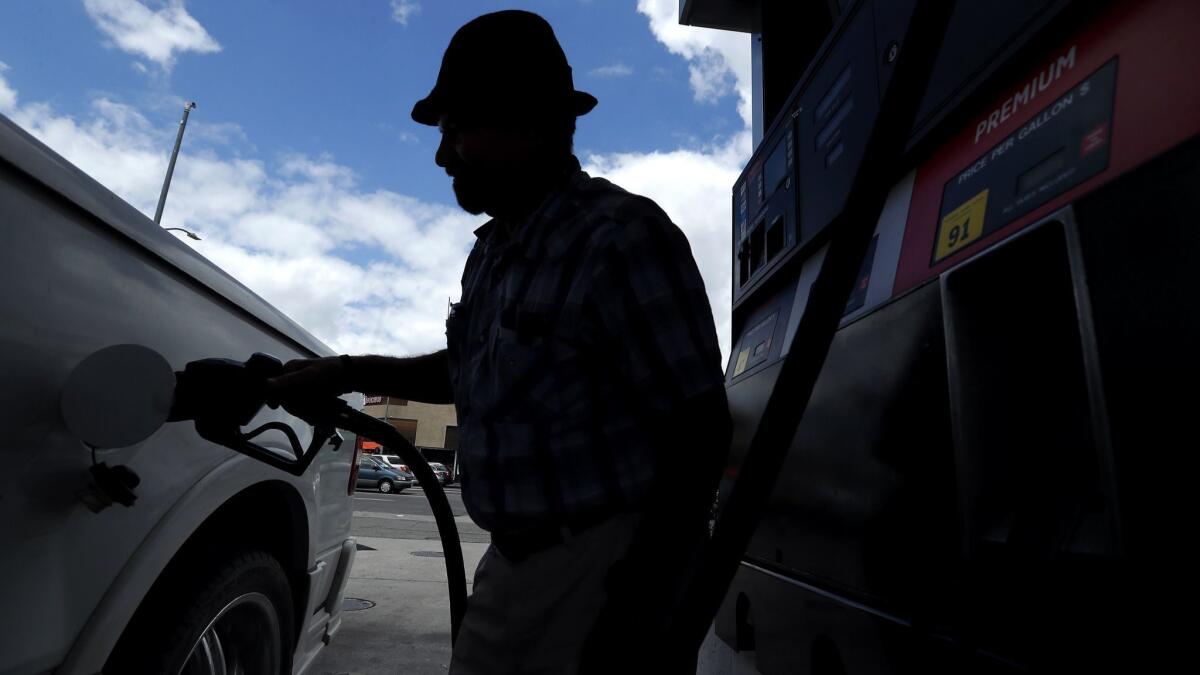Editorial: Spending gas taxes on public transit isn’t a misuse, it’s what California voters want

- Share via
The campaign to pass Proposition 6 — a contentious effort by anti-tax conservatives to repeal last year’s fuel tax and vehicle fee increases, eliminating $5 billion in transportation infrastructure funding — has been filled with even more gross exaggerations and misleading claims than voters are used to seeing. One of the worst is the assertion that the state is maliciously misspending gas tax revenue on — gasp! — public transit.
Proposition 6 campaign chairman Carl DeMaio likes to complain that lawmakers have “diverted” fuel taxes to pay for transit. DeMaio argues that gas tax revenues should be spent solely on roads.
Here’s the problem with that argument: Years ago, California voters explicitly gave the state the green light to spend gas tax money on public transit. They did so by approving a constitutional amendment on the June 1974 ballot (Proposition 5) that allowed fuel excise tax revenue to be spent on building and maintaining mass transportation systems. It also allowed the money to be used to lessen the environmental impact of highway and transit projects.
“While Californians take pride in having the finest highways in the world, we must concede that in many areas we’re nearly paralyzed because of congestion,” the supporters of the amendment wrote in the ballot argument mailed to every registered voter. “Unless we want to put much more of our State under an asphalt blanket, accompanied by increased taxes and a deteriorating environment, we have to begin moving in a new direction.”
The decision in the 1970s to allow gas tax revenue to be spent on public transit remains the right one.
Sound familiar? The amendment was passed during the gas shortages of the 1970s. Los Angeles was smothering under a layer of smog, and the state’s urban highways were increasingly clogged with cars. California voters made the rational decision then to begin a transition toward mass transit to cut air pollution, ease congestion and reduce reliance on oil.
It’s been slow going. The state’s fuel taxes have largely gone to highway projects and road maintenance. (And they still do. Two-thirds of the recent gas and diesel tax increases are dedicated to highway and road repairs, according to the Legislative Analyst’s Office.) There’s never been enough money to build out urban mass transit systems, although that’s changing as more counties pass sales tax increases for transportation investments. It’s also harder to build mass transit to serve the state’s sprawling suburbs and dispersed job centers. Again, that’s changing a bit as cities build more housing and jobs in their urban cores.
The decision in the 1970s to allow gas tax revenue to be spent on public transit remains the right one. California is still choking on unhealthy air, its highways are still clogged. And like much of the industrialized world, the state is racing to slash carbon emissions to avoid the worst effects of climate change, such as life-threatening heat waves and long periods of drought followed by destructive floods.
But to hear Proposition 6 supporters tell it, there’s no urgent need to address the climate threat. There’s no recognition that Californians have already committed to expanding public transit, or that investing in buses, trains and bike infrastructure is about giving people more choices to get around so they don’t have to waste productive time stuck behind the wheel.
Enter the Fray: First takes on the news of the minute from L.A. Times Opinion »
Instead, Proposition 6 backers are determined to convince voters that it’s all a nefarious scheme. For example, take what Republican Diane Harkey, who is running for the congressional seat being vacated by Darrell Issa, recently declared at a news conference:
“This is just fraud. It’s forcing you to take bikes, get on trains, hose off at the depot and try to get to work. That does not work. That does not work with my hair and heels. I cannot do that and I will not do that.”
That message seems designed to push a particular set of voters’ buttons. Republicans put Proposition 6 on the ballot in a nakedly partisan attempt to boost GOP turnout in the midterm. Comments like Harkey’s amplify the pitch to GOP voters outside of city centers — the ones who don’t rely on buses and trains.
The plain truth is, there is no fraud. There is no forcing. And there should be no turning back from a future that Californians endorsed four decades ago, where people can choose to drive or choose to take the bus or choose to bike — regardless of their hair or heels.
Follow the Opinion section on Twitter @latimesopinionand Facebook
More to Read
A cure for the common opinion
Get thought-provoking perspectives with our weekly newsletter.
You may occasionally receive promotional content from the Los Angeles Times.










